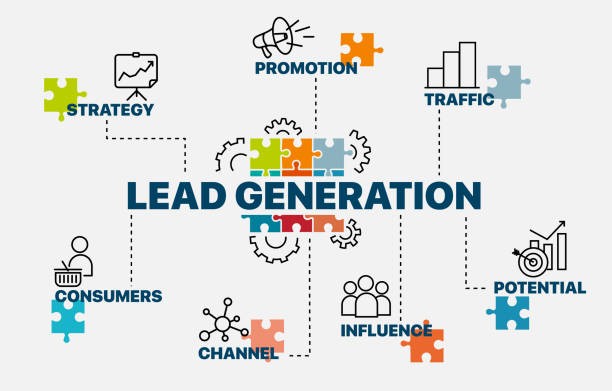Secrets of B2B Lead Generation

Introduction
In the rapidly evolving B2B marketplace, mastering the art of lead generation is pivotal. Businesses are continually seeking innovative and effective strategies to attract and convert prospects into loyal customers. This article explores a variety of lead generation techniques tailored for B2B companies, offering insights into both digital and traditional approaches, and integrating the latest technological advancements to streamline and enhance the lead generation process.
Lead Generation Essentials: Understanding the Basics
What is Lead Generation?
Lead generation strategy in the business context refers to the process of identifying potential customers (leads) and nurturing their interest through various strategies and channels until they are ready to make a purchase. In the B2B sector, where transactions are typically larger and more complex, lead generation is a critical starting point that involves detailed research and strategic outreach.
Importance of Lead Generation in B2B Markets
For B2B companies, lead generation is not just about increasing the number of potential sales contacts; it’s about creating a pipeline of high-quality leads that are more likely to convert into sales. Effective lead generation helps ensure a consistent flow of new prospects, which is essential for maintaining sales volumes and supporting sustainable business growth.
Key Metrics to Measure Lead Generation Success
Several metrics are crucial for assessing the effectiveness of lead generation strategies:
- Lead Conversion Rate: The percentage of leads that become customers.
- Cost Per Lead: The total cost of generating leads divided by the number of leads obtained.
- Lead to Opportunity Ratio: The rate at which leads become qualified sales opportunities.
- Return on Investment (ROI): Measures the profitability of the lead generation efforts compared to the costs.
Understanding and tracking these metrics help businesses optimize their lead generation strategies and allocate resources more effectively.
Developing Your B2B Lead Generation Strategy
Setting Clear Objectives for Lead Generation
Setting objectives involves defining what you aim to achieve with your lead generation efforts, such as increasing lead quantity by 20% or improving lead quality by 30%. These objectives should align with broader business goals and provide a clear direction for your marketing and sales teams.
Identifying Your Target Audience
Effective lead generation strategy begins with a deep understanding of your target audience. This involves segmenting your market and developing buyer personas based on demographics, firmographics, behavior patterns, motivations, and pain points. Tailoring your strategies to meet the specific needs and preferences of these defined groups increases the relevance and effectiveness of your outreach.
Aligning Your Sales and Marketing Teams
Alignment between sales and marketing is crucial for seamless communication and strategy implementation. Regular meetings and shared goals ensure that both teams are on the same page, leading to more efficient lead management and a higher conversion rate.
Digital Lead Generation Techniques
Leveraging SEO for Lead Generation
Search Engine Optimization (SEO) enhances your website’s visibility on search engines for relevant keywords. This involves optimizing your site’s content and structure to rank higher in search results, thereby attracting more targeted traffic. SEO is a powerful tool for lead generation, as it connects you with prospects actively seeking your products or services.
Content Marketing: A Strategic Approach
Content marketing involves creating and distributing valuable, relevant, and consistent content to attract and retain a clearly-defined audience. This approach not only boosts your SEO efforts but also positions your company as a thought leader. By providing useful information that addresses the specific needs and challenges of your target audience, you can build trust and encourage more engagements.
Email Marketing Tactics for Higher Conversion
Email marketing remains one of the most effective digital marketing strategies. It involves sending targeted messages to a list of subscribers to educate them about your products or services, keep them engaged, and guide them through the buying process. Personalization, segmentation, and automation are key components of a successful email marketing strategy that drives conversions and strengthens customer relationships.
Social Media Strategies for Lead Engagement
Social media platforms provide a valuable channel for engaging with potential and current customers. By sharing engaging content, responding to queries, and participating in conversations, companies can build relationships with their audience. Social media also offers advanced targeting options for ads, allowing businesses to reach specific segments of their audience with tailored messages.
Pay-Per-Click (PPC): Maximizing ROI
Pay-per-click advertising is an effective way to drive traffic to your website from search engines and social media platforms. By targeting specific keywords related to your business, you can attract high-intent visitors to your site. PPC campaigns offer the advantage of being easily measurable, providing clear insights into their effectiveness in terms of lead generation and ROI.
Using Webinars as a Lead Generation Tool
Webinars are an effective way to demonstrate your industry expertise, showcase your products, and interact with a live audience. They provide a platform for delivering valuable content and engaging directly with potential leads, fostering relationships and establishing credibility. Webinars also allow for immediate feedback and interaction, making them a powerful tool for engaging and converting prospects.
The Future of Lead Generation
Emerging Trends in Lead Generation
The future of lead generation is likely to be shaped by emerging technologies such as AI and machine learning. These technologies can enhance predictive analytics, automate more complex tasks, and personalize customer interactions at a deeper level, leading to more effective and efficient lead generation processes.
The Impact of AI and Machine Learning
AI and machine learning are transforming the way businesses identify and engage with potential leads. These technologies enable more precise targeting, automated content personalization, and enhanced decision-making processes, making lead generation more strategic and data-driven.
Sustainable Lead Generation Practices
As businesses increasingly prioritize sustainability, lead generation strategies must also align with these values. This includes adopting practices that minimize environmental impact and considering ethical implications of marketing strategies. Sustainable practices not only help protect the environment but also resonate with increasingly conscientious consumers, enhancing brand reputation and loyalty.




